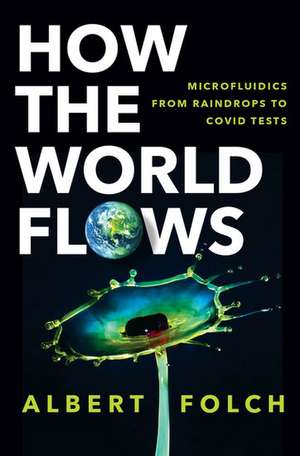How the World Flows: Microfluidics from Raindrops to Covid Tests
Autor Albert Folchen Limba Engleză Hardback – 11 iun 2025
Preț: 158.88 lei
Preț vechi: 179.93 lei
-12% Nou
Puncte Express: 238
Preț estimativ în valută:
30.40€ • 32.51$ • 25.35£
30.40€ • 32.51$ • 25.35£
Carte nepublicată încă
Doresc să fiu notificat când acest titlu va fi disponibil:
Se trimite...
Preluare comenzi: 021 569.72.76
Specificații
ISBN-13: 9780197772829
ISBN-10: 019777282X
Pagini: 304
Dimensiuni: 156 x 235 mm
Editura: Oxford University Press
Colecția OUP USA
Locul publicării:New York, United States
ISBN-10: 019777282X
Pagini: 304
Dimensiuni: 156 x 235 mm
Editura: Oxford University Press
Colecția OUP USA
Locul publicării:New York, United States
Recenzii
This book weaves together personal stories, explanations of natural phenomena, and technological innovations to bring to life the invisible cosmos of tiny droplets of fluid that deeply influence so many phenomena in our world. Readers will be both entertained and fascinated by Folch's revelations about the microdroplets that drive rainbows and monsoons, or the microscopic channels that fuel plants, people, and covid tests. I found it impossible to put down.
How the World Flows makes a significant contribution to the field of microfluidics. It will become a reference work for those seeking a comprehensive introduction, as well as for teachers and experts.
How the World Flows makes a significant contribution to the field of microfluidics. It will become a reference work for those seeking a comprehensive introduction, as well as for teachers and experts.
Notă biografică
Albert Folch is a Professor of Bioengineering at the University of Washington in Seattle, WA. He was born in Barcelona, Catalonia (Spain) and he graduated in Physics (B.Sc. 1989 & Ph.D. 1994) from the University of Barcelona. He did postdocs at MIT (1994-96) and at Harvard-MGH (1997-2000). His lab works on cancer microfluidics and 3D-printing. He received an NSF CAREER Award (2001) and was elected a member of the AIMBE College of Fellows (2014) and of the Institute of Catalan Studies (2022). Since 2007, his lab has produced an art outreach program called Bringing Art Into Technology (BAIT). Among other books, the author has written Introduction to BioMEMS (2012) and Hidden in Plain Sight (2022).
